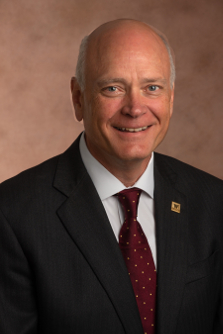
As the calendar turns to May and then June, Dr. Hal B. Jenson takes time to reflect on all that has been accomplished at the medical school.
The two-month span, he said, is “a season of celebration” at WMed as MD students – this year, the Class of 2019 – graduate this month and take their next steps into residency training. Several students from two of the medical school’s master’s degree programs will also graduate this month and, in June, resident physicians and fellows from WMed will be honored during a graduation ceremony at Western Michigan University’s Miller Auditorium.
“It is always rewarding to see our students and residents reach that milestone of graduation and move on to the next phase of their careers,” Dr. Jenson said. “Their success is our success.”
As the flurry of activity and excitement takes over, Dr. Jenson said he is also deeply mindful and grateful for the continued community support that has provided a strong foundation for the medical school and made all of it possible.
Dr. Jenson said the medical school’s Imagine Gala, now in its fourth year, is a tangible reminder of the growing community commitment and investment in the future of WMed. More than 430 guests are expected at the 4th Annual Imagine Gala, which will be held on Saturday, May 18, 2019, at the medical school’s W.E. Upjohn M.D. Campus in downtown Kalamazoo. The black-tie event has seen continued growth since the inaugural Gala in 2016, which included about 200 guests.
“The Gala is symbolic of the support the medical school has received from the community,” Dr. Jenson said. “It is our only fundraising event of the year and the community has embraced it with enthusiasm.”
The Gala helps with needed funding for Early Introduction to Health Careers (EIH), WMed’s pipeline programs for elementary and high school students from Kalamazoo and Battle Creek.
The pipeline programs are designed to champion the biomedical science and healthcare career aspirations of underrepresented youth. The programs also provide a platform for WMed medical students to design and teach interactive learning experiences to help elementary and high school students develop leadership, team-building, and problem-solving skills.
EIH was first launched at WMed in 2014 by Dr. Cheryl Dickson, the medical school’s associate dean for Health Equity and Community Affairs. Since then, the pipeline programs have blossomed and now serve more than 180 students annually, including 49 KPS sophomores in EIH 2 and 80 fourth and fifth graders from KPS in EIH 1. Additionally, the EIH model is being used to serve more than 50 eighth graders from three school districts in Calhoun County as part of efforts there to create programming and support for a health care career pipeline.
In addition to EIH, Dr. Jenson said he is also proud of the future physician pipeline WMed has created with its Master of Science in Biomedical Sciences degree program. Most recently, the program welcomed a cohort of eight students in 2018.
A distinct benefit of the program is the linkage to the medical school’s MD program, as students who successfully complete the master’s curriculum are conditionally accepted to the MD program for the following academic year. Each student also receives a full-tuition scholarship from the medical school to cover the cost of the master’s program, Dr. Jenson said.
The continued success of the medical school’s EIH program, as well as the Master of Science in Biomedical Sciences, MD, and residency and fellowship programs, is a direct result of the overwhelming support WMed has received from the community, Dr. Jenson said.
“It’s been very fulfilling to see how the community has supported the medical school in multiple ways,” Dr. Jenson said.
